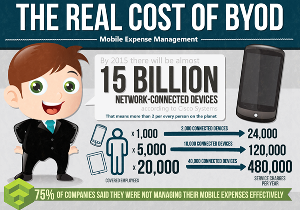 When we bring our own mobile computing device to the workplace, it’s seen as easy, convenient, and a sensible way to manage our digital life and work activities.
When we bring our own mobile computing device to the workplace, it’s seen as easy, convenient, and a sensible way to manage our digital life and work activities.
But the convenience comes at a cost: analysis of ‘bring-your-own-device’ workplaces by a major mobile solutions company shows that companies with a BYOD policy can shift operational costs directly to their employees, and the employee’s monthly phone bill or data plan. Employees cover all costs in half of all BYOD environments that the company researched.
Understandably, large enterprises and small businesses want to be able to take advantage of the added connectivity, productivity and costs-savings that smartphones and tablets are said to offer.
There aren’t many issues bigger than the size of our phone bills these days, but companies do face other hurdles when developing or implementing a BYOD strategy in the workplace.
Of course, big information technology issues must be addressed, and beyond hardware, software and application compatibility. Data privacy and device security must be considered, so too the impact on network service levels and disaster recovery planning.
Some BYOD policies let employees use whatever device, and whatever app, they want; in other cases, the IT department carefully controls the products and services they want to allow and blocks out other products from the office. In some cases, however, strict adherence to all corporate policies is hard to guarantee.
Yet IT staff and tech managers are just one part of the ‘bring-your-own-device’ decision-making process; many challenges come in HR.
Human resources specialists say that BYOD policies should determine whether an employer monitors the use of the devices, like their effect on employee productivity, and if so to what degree. Conversely, employers must be ready if employees make compensation and wage claims for ‘off-the-clock’ work using their own device.
There can be tax considerations if a device is provided, or if the supported use of a digital device is seen as an employment benefit.
Maintaining good control over work records, and protecting the confidentiality of those records, can be a big challenge when multiple mobile devices are used. An extreme example is health care: some EMS (emergency medical services) ban the use of any personal electronic device in the workplace, due for patient confidentiality and safety concerns.
Even when data and device privacy are well-managed, the costs of doing so can be a concern.
BYOD claims for work-related use, such as business trip roaming costs, can cause billing disputes, employee bad will and possible conflicts over specific charges or unpaid bills with the service provider, as well.
In fact, half of those employers surveyed about their BYOD policies said employees cover all costs, including device and data plans.
Employers hoping to improve business processes and profits with a BYOD strategy must define how the device can meet real business objectives, and adhere to an almost continual process of evaluation to ensure business goals are being met.
And that cellphone bills are being paid.
-30-
submitted by Lee Rickwood



